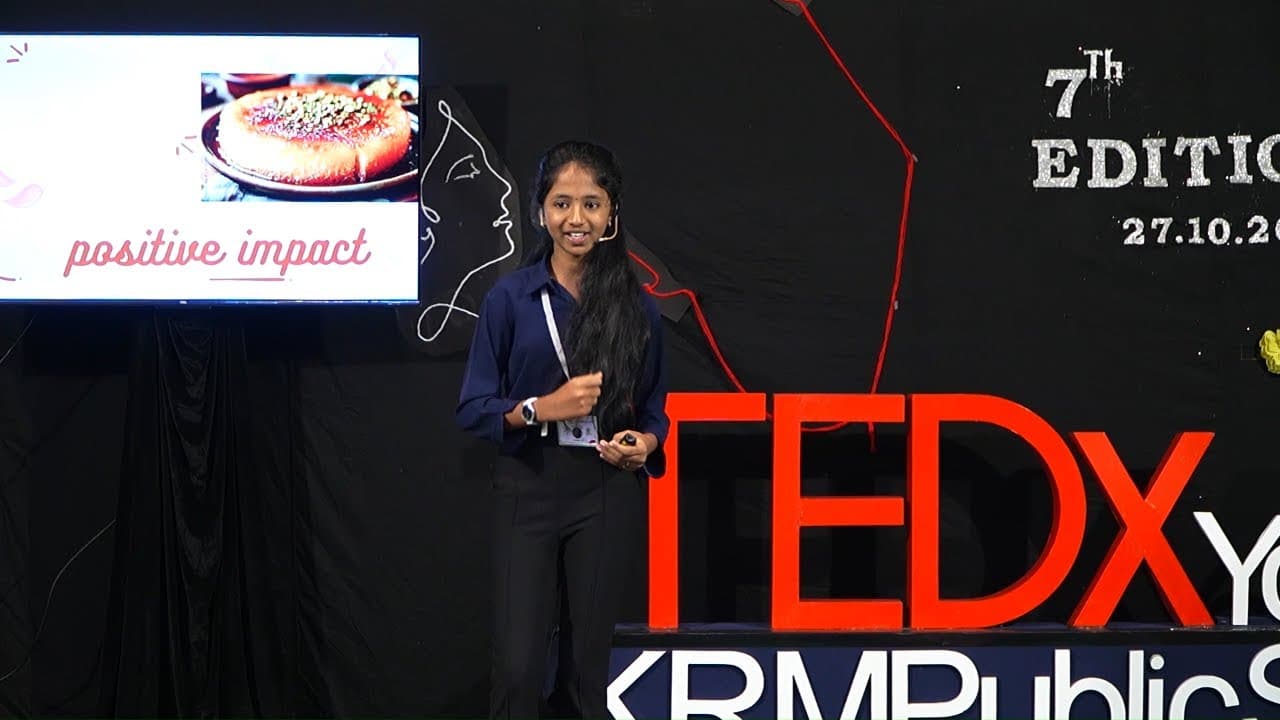EMBRACING A FOODIE WITHIN A CULINARY ADVENTURE | KRITHIKA V | TEDxYouth@KRMPublicSchool
30 Oct 2024 (1 year ago)

Introduction
- The presentation invites the audience to embark on a culinary journey, exploring tastes, textures, and aromas that evoke strong emotions and memories. (27s)
- Food is described as more than just sustenance; it is an art form where chefs blend ingredients to create masterpieces, similar to how painters use colors on a canvas. (2m11s)
- The speaker emphasizes the cultural diversity of food, mentioning various cuisines such as Mexican, American, Thai, Vietnamese, Chinese, South Indian, and North Indian, and how each dish tells its own story. (1m44s)
- Personal anecdotes highlight the joy and connection food brings, such as the comforting warmth of homemade dishes and the shared experiences of trying new foods with friends and family. (3m15s)
- Being a foodie involves embracing diversity, from enjoying a humble plate of mom's cooking to gourmet creations, and celebrating the symphony of flavors from around the world. (3m39s)
- The thrill of being a foodie lies in discovering hidden culinary gems, such as small ramen shops or secret spice markets, and the joy of mastering new cooking skills. (5m30s)
- Food is portrayed as a unifying force that brings people together, whether at family dinners or gatherings with friends, fostering connections and shared experiences. (6m5s)
- The presentation concludes with an encouragement to share meals and laughter with others, as life is too short to eat alone, and acknowledges the dual influence of food on our lives, both positive and negative. (6m27s)
Foodie Culture and Social Implications
- The foodie culture, while appearing to celebrate diverse culinary traditions, often emphasizes expensive and exclusive dining experiences, which can reinforce social inequalities by making such experiences accessible only to the privileged. (6m53s)
- This culture can also lead to cultural appropriation, where ethnic foods are commodified without acknowledging the people behind them, perpetuating classism and racism. (7m55s)
- To address these issues, it is suggested to prioritize inclusivity and honor the cultural significance and struggles of the communities from which these foods originate, moving towards a more community-focused approach to food. (8m46s)
Characteristics of Foodies
- Foodies are characterized by a strong interest in food, significant time spent preparing food, and a high knowledge of new preparation methods and ingredients. They represent a significant market segment for restaurants and food producers. (9m3s)
- The foodie phenomenon has contributed to the success of local social initiatives like farmers markets, crop sharing programs, and specialized food programming. (9m40s)
- Food adventurousness, or neophilia, refers to the willingness to try new foods, and the term "foodie" gained popularity from the book by Ann Barr and Paul Levy in 1984, defining a foodie as someone who considers food an art. (10m32s)
- Millennials in the United States, particularly those aged 25 to 33, often identify as foodies, influencing cultural food trends. (11m20s)
- Notable figures in the food blogging and culinary world include Ree Drummond, known for her farm-to-table recipes, and Gordon Ramsay, a famous judge on shows like MasterChef and Hell's Kitchen. (11m47s)
Food Festivals
- Food festivals are celebrated events where the preparation and enjoyment of food become a communal and festive experience. (12m36s)
- Various food festivals around the world celebrate different culinary delights. Pizza Fest in Naples, Italy, occurs every June and features events like pizza-making competitions and tastings, celebrating the iconic Neapolitan pizza. (12m41s)
- The Salon du Chocolat in Paris, France, held every October, is a haven for chocolate lovers, offering chocolate tastings, demonstrations, and even chocolate fashion shows. (13m13s)
- The Taste of Chicago, held every July, is the world's largest food festival, showcasing a wide variety of Chicago's culinary delights, including deep-dish pizza and hot dogs. (13m35s)
- The St. Moritz Gourmet Festival in Switzerland, held in January, brings together chefs from around the world to create gourmet dishes in a luxurious setting. (13m51s)
- The National Street Food Festival in India, held every December, celebrates India's diverse street food culture with stalls offering a wide variety of regional specialties, including dishes like Pani Puri, Masala Dosa, and Biryani. (14m15s)
Food Wastage and Sustainability
- While food festivals celebrate culinary diversity, there is also a concern about food wastage. The goal of achieving "zero hunger" is part of the United Nations Sustainable Development Goals, aiming to ensure everyone has access to safe, sufficient, and nutritious food. This initiative was launched in September 2015 and is supported by various Indian research councils. (15m56s)
- A survey was conducted to understand people's attitudes towards food donation and wastage. It highlights the importance of donating food to prevent wastage and ensure food security for all. (16m55s)
- Reflecting on childhood experiences, the text emphasizes the value of food and the importance of not wasting it, as every grain consumed is considered significant. (17m34s)
- During a seventh birthday celebration, excess food was donated to a nearby orphanage, creating a memorable and joyful experience. (18m35s)
- Encouragement is given to support humanitarian efforts like the World Food Program and to invest in small-scale farmers, emphasizing the importance of economic support for diverse talents and passions. (19m12s)
- An initiative by Dr. Fatima Jasmin in Chennai is highlighted, where a fridge has been installed to donate food and clothes for those in need, promoting the reduction of food waste. (19m45s)
- A call to action is made to embrace the joy of exploring diverse foods while focusing on sustainability and to contribute to the goal of zero hunger. (20m21s)
- A suggestion is made to donate 20% of food from celebrations to nearby orphanages, encouraging collective participation in addressing hunger. (20m39s)